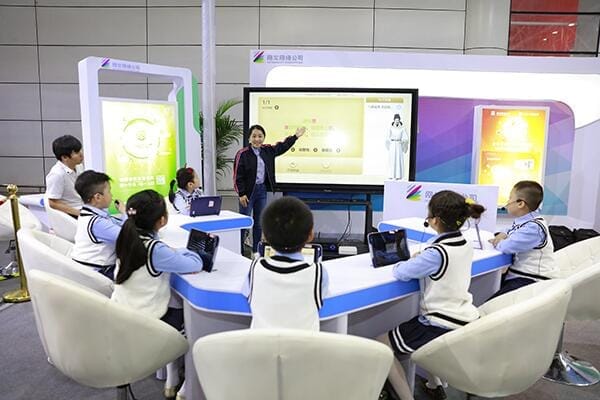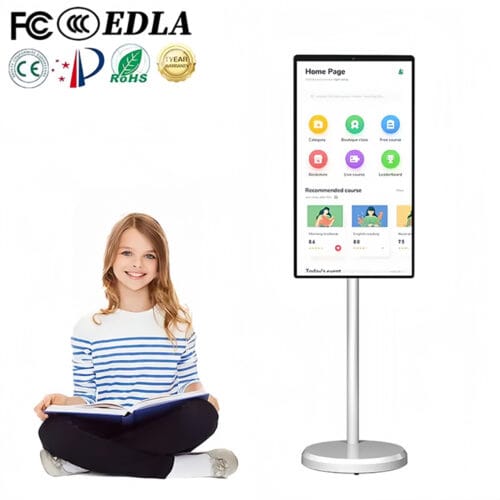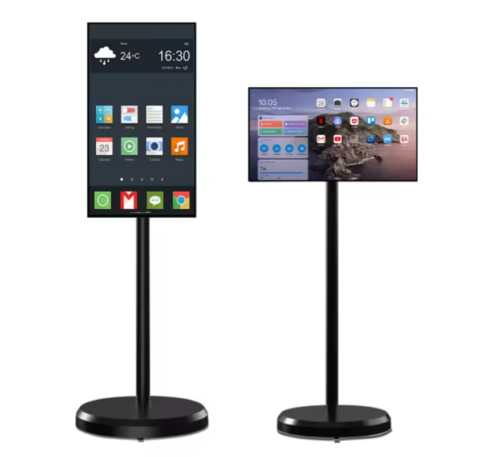
The rapid advancement of artificial intelligence (AI) is transforming multiple industries, and education is no exception. Integrating AI into educational tools is reshaping traditional learning and teaching experiences. Among the tools gaining traction is the rolling tablet, a device that combines portability with cutting-edge AI features designed to meet the evolving demands of education. This blog delves into the AI-powered capabilities of rolling tablets, focusing on their role in revolutionizing the educational landscape and enhancing classroom experiences for both students and educators.
In particular, we will explore how AI technology embedded in rolling tablets is enabling personalized learning, dynamic content generation, intelligent tutoring, and more. By leveraging AI, ONext’s rolling tablet stands out as a superior solution, offering robust features that empower teachers and students alike.
1. Personalized Learning Experience with AI
One of the most significant breakthroughs in education due to AI is personalized learning. Traditional classrooms often struggle to accommodate the diverse learning needs of individual students. Rolling tablets equipped with AI help bridge this gap by customizing educational content to fit each student’s unique needs, interests, and learning habits.
1.1 Adapting to Student Preferences
AI algorithms in rolling tablets analyze student performance, identifying strengths and weaknesses. This analysis allows the AI system to suggest tailored lessons, practice exercises, and resources that meet individual learning levels. For instance, if a student struggles with math concepts, the tablet may suggest additional video tutorials or interactive math games, ensuring the student doesn’t fall behind.
ONext’s rolling tablet leverages AI to monitor a student’s progress and provides real-time adjustments to the curriculum. This dynamic response ensures a personalized learning experience, which leads to higher engagement, motivation, and academic performance.
1.2 Encouraging Creativity and Critical Thinking
AI can do more than deliver personalized content; it can also inspire creativity. Through interactive learning environments, rolling tablets encourage students to solve problems in novel ways. AI simulations, virtual labs, and creative design tools allow students to explore subjects such as science, art, and technology in a hands-on, immersive way. This fosters creativity, innovation, and critical thinking, essential skills for 21st-century learners.

2. Intelligent Tutoring and Interaction: 24/7 Support
Another major benefit of AI-empowered rolling tablets is the inclusion of intelligent tutoring systems (ITS). These systems provide on-demand tutoring, offering students immediate feedback and support, even outside school hours. With AI-powered tutoring, students receive assistance whenever they need it, making learning continuous rather than restricted to the classroom environment.
2.1 AI as a Personalized Tutor
AI tutors embedded in rolling tablets utilize natural language processing (NLP) to interact with students conversationally. They can answer questions, explain difficult concepts, and even adjust the lesson plan based on the student’s progress and feedback. This allows students to receive support customized to their pace and understanding.
Imagine a student struggling to grasp a physics concept late at night before an exam. The AI tutor within the rolling tablet can break down the problem into simpler terms, provide additional practice questions, and even simulate real-world applications of the concept. ONext’s rolling tablet offers a highly interactive and intelligent tutoring experience, making learning both accessible and adaptable.
2.2 Enhancing Teacher-Student Interaction
While AI provides personalized tutoring, it doesn’t replace human teachers. Instead, AI enhances teacher-student interaction. By automating routine tasks, such as grading or attendance tracking, rolling tablets free up time for educators to focus on mentoring students and building deeper connections. AI can also assist teachers by offering insights into student performance, helping identify those who may need extra help or enrichment.

3. Dynamic Content Generation with AI
Static, one-size-fits-all learning materials are becoming obsolete. AI, combined with rolling tablets, offers dynamic content generation, adapting educational materials to match student progress and curricular requirements. AI can create real-time assignments, quizzes, and feedback, ensuring that educational content remains relevant and engaging.
3.1 Real-Time Adaptive Lessons
AI-powered rolling tablets continuously evaluate student performance and adjust lesson plans on the go. For example, if a class is moving through a history module faster than expected, AI can generate more in-depth, challenging content. Similarly, if students in a math course are struggling, the AI system might slow down the lesson pace or introduce new ways of explaining concepts.
ONext’s rolling tablet provides teachers with dynamic content generation tools that align with the students’ learning curves. It enhances classroom efficiency by offering customized learning paths that evolve in real-time.
3.2 Engaging Practice Activities
Beyond lessons, AI in rolling tablets offers an array of interactive activities, from quizzes to interactive games, designed to reinforce learning. These AI-generated activities adjust difficulty levels in real-time, ensuring they match the student’s abilities. As a result, students are more likely to stay engaged and retain information.
4. Intelligent Evaluation and Feedback
In the modern classroom, AI-empowered rolling tablets play a crucial role in real-time evaluation and feedback. AI technology analyzes student performance, offering both students and teachers a clear understanding of where improvements are needed.
4.1 Immediate, Data-Driven Feedback
In traditional settings, feedback often comes too late to be useful. AI, however, can provide immediate and data-driven feedback. Rolling tablets equipped with AI track every interaction a student has with the device—from practice questions to test answers—generating reports that highlight areas for improvement. For instance, if a student continuously answers a particular type of question incorrectly, the AI system will notify both the student and teacher, suggesting additional resources to improve understanding.
4.2 Reducing Teacher Workload
This automated feedback reduces the burden on educators, who would otherwise spend significant time grading assignments and tracking progress. AI handles these tasks, giving teachers more time to focus on lesson planning, classroom management, and one-on-one interaction with students. ONext’s rolling tablet offers a comprehensive evaluation system that benefits both students and teachers, improving efficiency and learning outcomes.

5. AI for Special Education Needs
One of the most transformative features of AI in education is its ability to support special education. Students with disabilities, such as those who are visually or hearing impaired, often require customized learning solutions. AI-empowered rolling tablets provide these solutions by adapting content to meet individual needs.
5.1 Adaptive Learning for Students with Disabilities
For students with hearing impairments, AI can convert spoken lessons into real-time subtitles, making classroom content accessible. Meanwhile, students with visual impairments can benefit from voice-to-text functions, screen readers, and other AI-driven assistive technologies embedded in rolling tablets.
ONext’s rolling tablet takes adaptive learning a step further by offering specialized features designed for inclusive classrooms. This ensures that all students, regardless of their abilities, have access to high-quality education.
5.2 Customizable Learning Interfaces
AI also enables rolling tablets to customize user interfaces based on the specific needs of the student. Larger text, high-contrast themes, and simplified navigation are just a few ways AI can adjust a rolling tablet’s interface to make it more user-friendly for students with disabilities.
6. Automation in Education Management
AI not only supports student learning but also plays a significant role in automating administrative tasks. Rolling tablets equipped with AI can streamline school management processes, such as attendance tracking, scheduling, and grade management.
6.1 Attendance and Behavior Monitoring
Gone are the days of manual attendance tracking. AI-enabled rolling tablets can automatically record student attendance through facial recognition technology or other biometric systems. Additionally, these devices can monitor student behavior, identifying patterns that may indicate issues such as disengagement or difficulty focusing.
ONext’s rolling tablet is equipped with advanced AI features that ensure seamless school administration, helping teachers and administrators manage time more efficiently and focus on delivering high-quality education.
7. Preparing Students for the Future
Education must evolve to prepare students for a future driven by technology. AI-enabled rolling tablets help students develop 21st-century skills, such as digital literacy, problem-solving, collaboration, and critical thinking.
7.1 Encouraging Technological Proficiency
As students interact with AI-powered tools from an early age, they become proficient in navigating complex technologies, which will be essential for their future careers. Rolling tablets equipped with AI are not just educational devices but also training grounds for the next generation of innovators.
8. The Future of Education with AI and Rolling Tablets
The future of education is digital, and AI is at the forefront of this transformation. Rolling tablets equipped with AI are leading the way by offering personalized, dynamic, and interactive learning experiences. These devices are reshaping how teachers teach and students learn, making education more accessible, engaging, and effective.
ONext’s rolling tablet is setting new standards in education technology, offering customizable features, intelligent tutoring, and real-time feedback that empowers students and teachers alike. As AI continues to evolve, the possibilities for its integration into education are limitless.

Conclusion
As we look toward the future of education, it’s clear that AI-powered rolling tablets are pivotal in shaping how students learn and how teachers teach. From personalized learning experiences to intelligent tutoring systems and support for special education, AI is revolutionizing education by making it more adaptive, inclusive, and efficient.
ONext’s rolling tablet stands out as a leader in this space, offering unparalleled features that cater to the diverse needs of modern classrooms. With its AI-powered functionalities, this device is helping pave the way for a future where education is more personalized, interactive, and dynamic than ever before.
For educators, students, and institutions looking to embrace the future of education, ONext’s rolling tablet offers the perfect solution.
Best selling product
-
 24 inch Stand By Me TV Movable Touch Television
24 inch Stand By Me TV Movable Touch Television -
 27-Inch Portable Tv Monitor On Wheels Touch Screen 1080p 64GB Storage Smart Screen,Portable Monitor Rotating Display With Mobile Base,With Built-in Battery ,Smart Monitor with Type-C Port
27-Inch Portable Tv Monitor On Wheels Touch Screen 1080p 64GB Storage Smart Screen,Portable Monitor Rotating Display With Mobile Base,With Built-in Battery ,Smart Monitor with Type-C Port -
 Portable Smart TV 32″ 1080P Touch Screen Monitor on Wheels, Android OS 13 Built-in Battery, Detachable Camera and Stand, Full Swivel Rotation Rolling Tablet for Kitchen, Bedroom, Outdoors
Portable Smart TV 32″ 1080P Touch Screen Monitor on Wheels, Android OS 13 Built-in Battery, Detachable Camera and Stand, Full Swivel Rotation Rolling Tablet for Kitchen, Bedroom, Outdoors -
 Stand by Me TV 21.5-Inch 1080P Portable TV on Wheels Touch Screen Monitor, Built in Battery, Full Swivel Rotation, Android12, 60Hz Refresh Rate
Stand by Me TV 21.5-Inch 1080P Portable TV on Wheels Touch Screen Monitor, Built in Battery, Full Swivel Rotation, Android12, 60Hz Refresh Rate